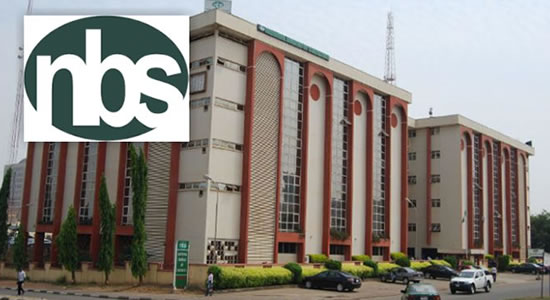National Bureau of Statistics (NBS) says the nation’s Gross Domestic Product (GDP) grew by 1.94 per cent (year-on-year) in real terms in the second quarter of 2019.
The NBS said this in its “Nigeria GDP Report for Second Quarter 2019’’ released on Tuesday in Abuja.
According to the NBS, the figure indicates an increase of 0.44 per cent compared to a growth rate of 1.50 per cent recorded in the second quarter of 2018.
It, however, said the figure, when compared to 2.10 per cent (revised from 2.01 per cent due to oil output revisions) recorded in the first quarter of 2019, showed a decline of –0.16 per cent points.
According to the bureau, the aggregate GDP stood at N34.79 million in nominal terms, an increase of 13.83 per cent over the performance in the second quarter of 2018 and 9.8 per cent over the preceding quarter.
The bureau said the figure was higher than N28.43 million recorded in the first quarter of 2018, representing a year-on-year nominal growth rate of 11.80 per cent.
“The performance observed in quarter two, 2019 follows an equally strong first-quarter performance, and was likely aided by stability in oil output as well as the successful political transition,” it stated.
It said that overall, a total of 15 activities grew faster in the second quarter of 2019 relative to 2018, while 13 activities had higher growth rates relative to the preceding quarter.
“On a half-year basis, real growth in the first half of 2019 stood at 2.02 per cent, higher than in 2018 which was 1.69 per cent.
“Quarter-on-quarter, real GDP increased by 2.85 per cent compared to a decline of –13.69 per cent in the preceding period,” it added.
The bureau said that for better clarity, the Nigerian economy had been classified broadly into the oil and non-oil sectors.
For the oil sector, the NBS said the nation posted a real growth rate of 5.15 per cent (year-on-year) in the period under review, representing a 9.10 per cent increase relative to the rate recorded in the corresponding quarter of 2018.
This, it said, also indicated an increase of 6.61 per cent when compared to the first quarter of 2019, adding that quarter-on-quarter, the oil sector recorded a growth rate of –1.55 per cent in the second quarter.
According to the report, the sector contributed 8.82 per cent to total real GDP in the second quarter of 2019, up from levels recorded in the corresponding period of 2018 but down compared to the preceding quarter.
“In quarter two, 2019, Nigeria recorded average daily oil production of 1.98 million barrels per day (mbpd), or 7.6 per cent higher than the daily average production of 1.84 mbpd recorded in the same quarter of 2018.
“This, however, is slightly less than output recorded in quarter one, 2019 (1.99 mbpd-revised from 1.96 mbpd),” it stated.
The NBS said that the non-oil sector grew by 1.64 per cent in real terms during the reference quarter.
It added that the growth was –0.40 per cent points lower than recorded in the same quarter of 2018, and -0.83 per cent points lower than the first quarter of 2019.
According to the bureau, during the quarter, the sector was driven mainly by Information and Communication, Mining and Quarrying, Agriculture, Transportation and Storage and other Services.
“In real terms, the non-oil sector contributed 91.18 per cent to the nation’s GDP, lower than the share recorded in the second quarter of 2018 (91.45 per cent).
“This, however, is higher than the first quarter of 2019 (90.78 per cent),” he said.
The bureau said that Quarterly National Accounts (QNA) were an integrated system of macroeconomic accounts designed to describe the entire system of production in a nation on a quarterly basis.
They provide a picture of the current economic status of an economy on a more frequent basis than Annual National Accounts.
In providing a reasonable level of detailed information of the economy, QNA allows the government to regularly access analyse and monitor economic developments.




















)